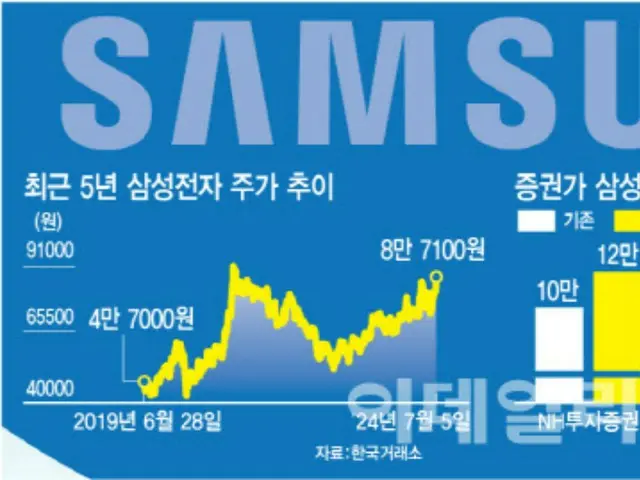With the market moving in a direction that aims to surpass the 100,000 won mark, investors are most interested in whether Samsung Electronics' stock price will rise to the 100,000 won range as predicted by the securities industry.
The market is evaluating Samsung Electronics positively. The positive impact of the launch of new semiconductor products is expected to continue in the second half of the year.
The company is expected to see a surge in sales of its high-bandwidth memory (HBM) chips, which have been a drag on Samsung Electronics' stock price, and there are signs that concerns about the company's high-bandwidth memory (HBM) technology will be resolved.
Samsung Electronics, which has been left out of the semiconductor stock market until now, is showing signs of an upward trend as expectations grow that it will soon begin supplying its fifth-generation high-bandwidth memory to NVIDIA.
According to the Korea Exchange, Samsung Electronics closed at 87,100 won on the 5th, up 2.96% from the previous day. This is the highest closing price since January 25, 2021 (
The previous day, Samsung Electronics' stock price had exceeded 80,000 won on the expectation that NVIDIA's high-bandwidth memory test approval was imminent.
The reason for this increase is the second-quarter performance, which far exceeded market expectations. Samsung Electronics' second-quarter sales increased 23.31% year-on-year to 74 trillion won (about 8.6 trillion won).
Samsung Electronics' net sales were 10.4 trillion won (US$10.0 billion), almost the same as market expectations, but its operating profit increased 1,452.24% to 10.4 trillion won (US$10.2 billion), exceeding market expectations by more than 25%.
This is the first time in seven quarters since the third quarter of 2022 that Samsung Electronics' quarterly operating profit has exceeded 10 trillion won. It is analyzed that Samsung Electronics' strong performance in the second quarter was driven by its memory semiconductor division.
Lee Min-hee, a researcher at BNK Investment Securities, said, "The average selling prices of DRAM and NAND have risen, which is likely why there has been additional write-off of inventory valuation losses, especially for NAND."
On the 5th, the day Samsung Electronics released its provisional second-quarter results, foreign investors bought 1.1846 trillion won (US$1.377 billion) worth of Samsung Electronics shares, while institutional investors bought 586.6 billion won.
As the company's stock price hit its highest level in three years and five months, individual investors sold 1.7272 trillion won (about 1.8 billion yen) in order to lock in profits.
The securities industry expects that favorable factors for Samsung Electronics will continue in the future, and the fact that Samsung Electronics shares have been left out of the popularity of artificial intelligence (AI) semiconductor stocks has also made them attractive.
As a result, securities companies have been raising their target stock prices since Samsung Electronics announced its favorable second-quarter earnings.
BNK Investment Securities also raised its target price from 93,000 won to 102,000 won. Hana Securities has also raised its target price from 93,000 won to 102,000 won.
The securities industry has revised its target share price from 106,000 won to 117,000 won. It is believed that the factors that have been holding back the rise in Samsung Electronics' stock price will be eliminated.
Ryu Young-ho, a researcher at NH Investment & Securities, said, "In the second half of the year, the positive impact of new semiconductor product launches and concerns about high-bandwidth memory are likely to be resolved.
"We expect that the factors behind the stock price slump will be resolved," he said. In particular, NVIDIA has been lagging behind rivals in supplying high-bandwidth memory to NVIDIA.
"The memory supply and demand situation is continuing to be tighter than initially expected, and DRAM and NAND prices are expected to rise to their previous levels," said Kim Rok-ho, a researcher at Hana Securities.
"High-bandwidth memory is also being smoothly supplied to suppliers other than NVIDIA, and it is expected that a decision will be made on whether to supply it to NVIDIA during the third quarter."
"Taking into account the above, the company's stock price is significantly lower than that of its rivals," said Kim Dong-won, a researcher at KB Securities.
"However, second-quarter results showed that Samsung Electronics' stock price rose by only 20% due to concerns over the quality approval of Nvidia's high-bandwidth memory," he said.
The surprise will be driven by rising prices of commodity DRAM and NAND, and the proportion of commodity DRAM sales is expected to increase toward the end of the year, leading to a large improvement in business performance in the second half of the year.
did.
2024/07/08 07:20 KST
Copyrights(C) Edaily wowkorea.jp 107

